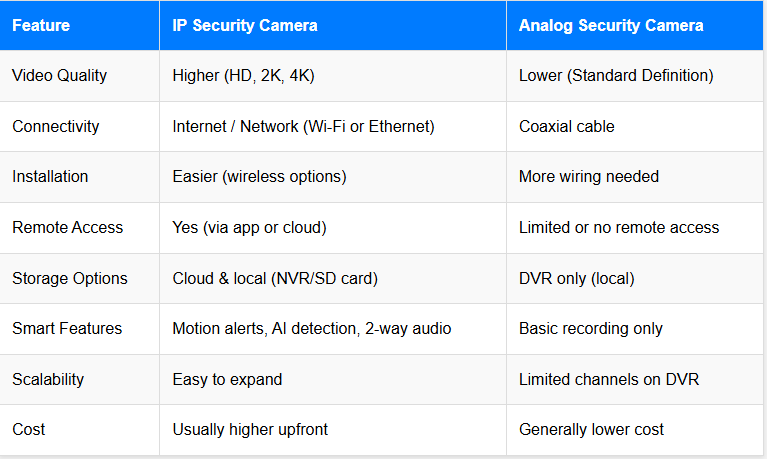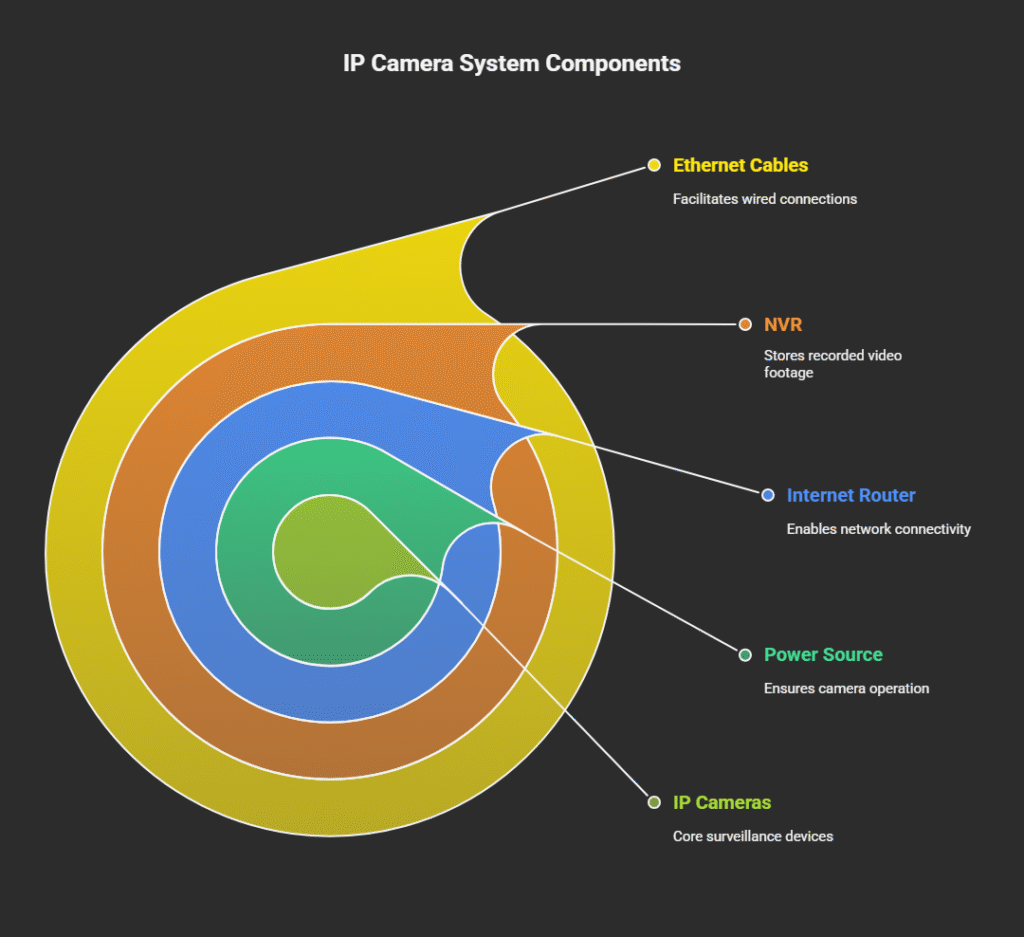IP security cameras have changed home protection completely. Today, more than 73% of homeowners choose these smart cameras over old CCTV systems. But what makes them so special?we’ll quickly break down what IP cameras do—and how they compare to traditional analog cameras.

An IP security camera is a digital camera that sends video through your home internet. Unlike old cameras that need lots of wires, IP cameras send clear HD video straight to your phone, tablet, or computer. This means you can watch your home 24/7 from anywhere in the world.
These cameras first came to market in the late 1990s and have grown fast ever since. The global IP camera market was estimated at USD 15.21 billion in 2024 and is projected to grow at a CAGR of 13.4% annually. Asia Pacific holds the largest market share with 47% in 2023, followed by North America. North America was the largest revenue generating market in 2024, while the region accounts for over 40% of the global IP camera market.
Global Market Overview IP Security Cameras
| Metric | Value | Source |
| Global Market Size 2024 | $13.7 – $15.21 billion | Multiple research reports |
| Projected Size 2030 | $31.11 – $43.62 billion | Grand View Research |
| Growth Rate (CAGR) | 11.3% – 13.4% | Industry average |
| Units Sold 2024 | 126.64 million cameras | Market statistics |
IP cameras offer many great benefits that make them worth knowing about. You can watch your property instantly from any place with internet. They record in 4K quality with night vision that captures clear evidence even in the dark. Smart motion detection sends alerts to your phone but reduces fake alarms. Your videos automatically save to the cloud, so you won’t lose footage even if someone steals the camera. Installation is easy because they connect wirelessly, saving you money on professional setup. Plus, you can easily add more cameras later as your security needs grow.
With home break-ins happening every 25.7 seconds in the US, IP security cameras give modern families the protection they need. Learning about these cameras isn’t just helpful – it’s necessary for making smart security choices for your home.
What devices are required for IP camera setup?
It is important to know which devices are needed for an IP security camera setup, whether you are doing a new install or buying equipment for your home or business. Having the right components from the start ensures a smooth installation, reliable performance, and a system that truly meets your security needs. The core requirements are similar for most properties, but a business system may simply need more of them. To help you prepare, here is a clear list of the essential devices you will need to get your system up and running.
Device List for IP Security camera:

- IP Cameras (indoor/outdoor, wired or wireless)
- Power Source (power adapters or PoE switch/injector)
- Internet Router (for network connectivity)
- NVR (Network Video Recorder) (with hard drive for storage)
- Ethernet Cables (Cat5e/Cat6 for wired connections)
- Optional: MicroSD Card (for standalone camera recording)
Why You Should Get to Know IP Security Cameras
let’s talk security cameras. You’ve probably heard about IP cameras, but what’s the big deal? Well, if you’re still using an old clunky CCTV system or no system at all, getting familiar with IP cameras might just change how you think about keeping your home or business safe. It’s not just about watching a screen anymore – it’s about having a smart security system that works with you, not against you.
So How Do These Things Actually Work?
Think of an IP camera as a smartphone with a really good camera lens. Instead of sending fuzzy analog signals like old systems, it takes sharp digital video and sends it through your internet network. This means you can check on your place from your actual phone, whether you’re at work, on vacation, or just cozy on your couch.
The cool part? Many models can operate wirelessly, so no more tripping over messy cables. Even the wired versions typically use just one cable for both power and internet, which is way simpler than the complicated wiring of older systems.
What You’ll Want to Think About Before Buying
Before you jump in, here’s the real-world stuff that matters:First, know what you’re actually buying. You’ll need the cameras themselves, something to power them (usually either individual plugs or one central power box called a PoE switch), your internet router, and somewhere to store the footage (like a cloud service or a physical recorder).

Your Wi-Fi matters more than you might think. A weak signal will mean frustrating lag or disconnections when you’re trying to check your feed remotely.
Think about how much recording you really need. If you only need footage when something happens, motion-activated recording with cloud storage might be perfect. If you want 24/7 recording, you’ll probably want a physical hard drive setup.
Most importantly, match the camera to your actual life. Need to see your driveway at night? Look for great night vision. Watching a large living room? A wide-angle lens is your friend. Running a small shop? Maybe just one or two cameras at key points is all you need.
Getting to know IP cameras means understanding that modern security is about working smarter, not harder. It’s about having a system that fits your life and gives you genuine peace of mind, not just another piece of technology to figure out.
IP Camera FAQs: Your Simple Questions, Answered
This Content provides a comprehensive collection of frequently asked questions (FAQs) about IP cameras, designed to address common queries and concerns. Whether you’re a beginner exploring the world of IP cameras or an experienced user seeking specific information, this guide offers clear and concise answers to help you understand and utilize IP cameras effectively.
What exactly is an IP camera?
Think of it as a smart, digital version of an old security camera. Instead of sending a fuzzy signal to a closed TV, it sends clear video over your internet—just like your phone sends a video call. This lets you watch your home or business from anywhere, right on your smartphone.
Do IP cameras work without the internet?
They can still record video locally (to a memory card or hard drive) without internet, but you won’t get alerts or be able to watch live from your phone. So internet is needed for all the “smart” features we love.
Are IP cameras hard to set up?
Not at all! Many newer models are designed for easy DIY setup—especially Wi-Fi cameras. You often just plug them in, download an app, and follow simple instructions. Wired systems take a bit more effort but are still very doable.
Can people hack into my IP camera?
It’s possible, but very unlikely if you take simple steps like using a strong password, keeping your camera’s software updated, and using a secure Wi-Fi network. Today’s cameras come with much better security than older models.
Do I need special wiring for IP cameras?
Only if you choose wired (PoE) cameras. These use a single Ethernet cable for both power and internet. Wireless cameras just need a power outlet nearby and a good Wi-Fi signal.
How much does a good IP camera system cost?
You can get a decent single camera for as little as $50–$100. Full systems with multiple cameras and a recorder usually start around $300–$500. There are options for every budget!
Can I watch recorded footage on my phone?
Yes! That’s one of the best features. Whether your videos are saved in the cloud or on a hard drive at home, you can usually watch them anytime through the app.
Do IP cameras work in the dark?
Most do! They use infrared night vision to see clearly in total darkness, though usually in black and white. Color night vision is also available in some newer models.
What’s the difference between cloud storage and an NVR?
Cloud storage saves video online (usually with a monthly fee), while an NVR is a physical box with a hard drive that stores video at your home. Cloud is convenient; an NVR is a one-time cost and keeps your videos local.
Can I install IP cameras myself, or do I need a professional?
Many people install them themselves—especially indoor or Wi-Fi models. If you’re comfortable with basic tech and maybe a little light drilling, you can probably do it. For larger properties or wired systems, you might prefer a pro for a super clean setup.
